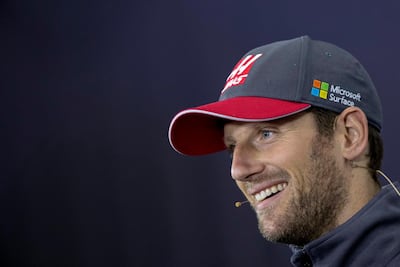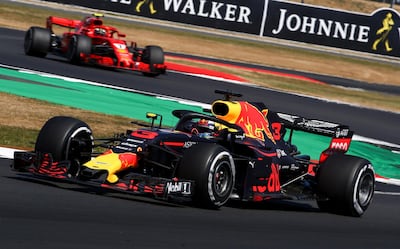Formula One returns to action after a rare weekend off with Sunday’s German Grand Prix.
Here are some of the things to watch for at Hockenheim.
Vettel looks for home love
Sebastian Vettel has achieved many things in his illustrious F1 career. Four world titles and 51 wins is pretty good going for a driver who at 31, still has plenty of time to add to those tallies.
One glaring omission from the German's glittering CV though is a win at Hockenheim. His lone victory on home soil was at the Nurburgring in 2013 when he was with Red Bull Racing.
His best result in five attempts is third place in 2010, but that could well change on Sunday.
The German comes to home territory having won on Lewis Hamilton's turf at Silverstone earlier this month.
Then he was helped by teammate Kimi Raikkonen spinning into Hamilton at the start after they made contact, but the speed of the Ferrari, and the power of its upgraded engine, made the Italian marque a genuine force at a venue they had traditionally struggled at in recent years.
There are two long straights in Hockenheim that should suit the Ferraris again, and Vettel must look to make it count if he wants to extend his eight-point championship lead.
Ricciardo needs to dig deep
Daniel Ricciardo’s future beyond the end of this season is yet to be confirmed.
Reports claim the Australian is likely to remain at Red Bull, given there appears to be no seats available at either Mercedes-GP or Ferrari in 2019.
If he chooses to stick with Red Bull the Australian has to solve the problem of just how to beat teammate Max Verstappen.
The Dutchman has had the edge on raw pace on Ricciardo throughout the season, but seemed unable to stay out of trouble in the opening races.
Ricciardo gained plaudits for his wins in China and Monaco, and he deserved them. But it is worth acknowledging Verstappen had been ahead of him in China and chucked away his victory chance with a wild attempt to past Hamilton.
Then in Monaco he had been quicker in practice before he crashed and ruined his weekend as he damaged his car so badly it could not compete in qualifying.
Again, that should not detract from Ricciardo’s efforts. He rarely makes a mistake and he produced the goods in Shanghai and Monaco. But since then Verstappen has cut out the errors and he has trounced Ricciardo over the past four weekends in Canada, France, Austria and Britain.
He would have finished ahead of Ricciardo at all four races had a gearbox problem not stopped him at Silverstone.
Ricciardo must find some momentum again and a strong weekend in Germany is needed.

Grosjean racing for his career
The pity is that when he stays out of trouble Romain Grosjean can be a superb driver. His fourth place in Austria earlier this month for Haas showed what he can do. But the fact it was his first points of the season, in what was the ninth race of the campaign, in the fourth quickest car in the field, highlighted what a messy year it has been for the Frenchman.
He was back at it at Silverstone as he crashed heavily in practice, hit his teammate Kevin Magnussen at the start and then crashed into Carlos Sainz’s Renault at high speed.
Grosjean’s inconsistency is hurting Haas. They are 19 points behind fourth-placed Renault in the constructors’ championship, a fact largely due to the Frenchman’s poor scoring. Magnussen has 39 points to Grosjean's 12, and has finished in the top 10 six times this season.
Grosjean starts this weekend knowing he realistically has 11 races to the end of the season to save his drive for 2019. He must prove performances like Austria are not an one-off.
______________
Comment: After Barcelona blunder, Romain Grosjean's dream of driving for Ferrari one day up in smoke
______________
Safety car factor
Teams are beginning to adapt to the new unpredictable element of F1. Namely the Virtual Safety Car (VSC) or the Safety Car.
There has been at least one full course caution period, or a VSC, at nine of the 10 races so far this season, and they arguably changed the course of the race in Australia, China, Azerbaijan and Austria.
Mercedes have been accused, of being slow to react to developing situations when a VSC period is called.
Not stopping in Austria when the VSC was used by race stewards cost Hamilton the lead, but in Silverstone he gained three positions on track by not stopping. In that sense, maybe Mercedes are not as bad on calling strategy as has been perceived.
But given the high rate of incidents so far this season, teams will be trying to cover for every eventuality ahead of Sunday’s action.



